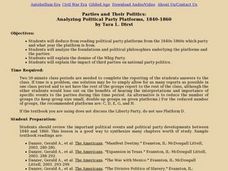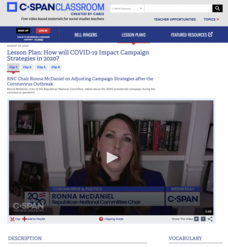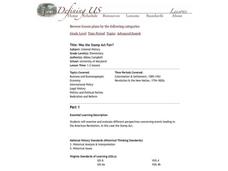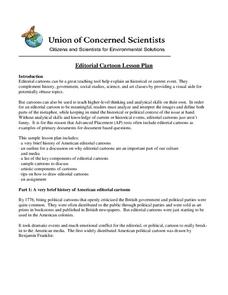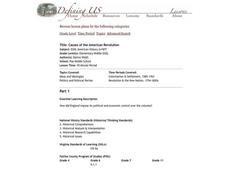Curated OER
Analyzing Political Party Platforms, 1840-1860
Students deduce from reading political party platforms from the 1840s-1860s which party and what year the platform is from. They analyze the foundations and political philosophies underlying the platforms and the parties.
C-SPAN
Debates
How do the presidential debates of 2016 compare to the debates from the 1980's? What about the 1960's? Evaluate a chosen candidate or issue from the 20th and 21st centuries with a lesson plan focused on political debates. Middle and high...
Curated OER
Political Parties
Twelfth graders give their current events presentations to the class today. After completing the "T" exercise on classifying certain individuals as Democrats or Republicans, they pair up to figure out where the political parties fit into...
Curated OER
Political Spectrum
In this government worksheet, learners identify and describe the differences between each part of the political spectrum by listing some points under each title in the chart. Then they choose any of the 9 issues listed, discuss and...
Curated OER
Political Ideological Spectrum
Students explore the ideologies of the American political spectrum. In this American politics lesson, students examine the characteristics and platforms of liberals, conservatives, libertarians, and moderates. Students complete the...
City University of New York
Urban Politics: Machines and Reformers
What were political machines and whom did they serve? As part of a study of US immigration patterns and how these patterns influenced politics, groups investigate how Tammany Hall and other political machines gained support from voters.
Curated OER
Presidential Election Year: Major Issues
Whether or not it's a presidential election year, this debate activity will spark research on current political issues. Split your government scholars into 4 groups and assign each a political party. One person will be the "candidate"...
Curated OER
The Presidential Campaign Game
Upper graders play a game as a way to facilitate understanding of US Presidential Campaign issues and strategies. After being divided into small groups, a candidate will be chosen to run for office. Each group creates propaganda to get...
C-SPAN
How will COVID-19 Impact Campaign Strategies in 2020?
While COVID-19 has changed almost everything about daily life, it's also had a tremendous impact on the 2020 presidential contest. Using video clips featuring political advisors from both sides of the aisle, learners brainstorm what they...
Curated OER
Redistricting: How Our Representatives Select Voters
Young scholars examine the practice of redistricting. In this American politics lesson, students read the provided articles "The Gerrymander," and "Reforming the Gerrymander." Young scholars respond to the provided discussion questions.
Curated OER
The Solid South Switcharoo
High schoolers examine primary sources. In this instructional activity on political parties, students view historic documents, speeches, and photos to trace the rise and fall of particular political parties. High schoolers will be...
Curated OER
The First North Americans
High schoolers identify and interpret the different North American Indian groups, by region, and the type and impact of their interaction with Europeans.
Then they complete an overview of one main Native American group during the age of...
Curated OER
Political Cartoons Illustrating Progressivism and the Election of 1912
Students study a current political cartoon to introduce the ideas of symbolism, humor, exaggeration, and caricature in editorial cartoons. They study cartoons from the past to gain an understanding of the culture of 1912.
Curated OER
How Did the Progressive Party affect American Society
Ninth graders explore the political views of the Progressive Party. In this U.S. History lesson, 9th graders read the "LaFollette Platform," then share their thoughts of the reading in a class discussion. To conclude the lesson, students...
Curated OER
Major Events Leading to the American Revolution
Students explore the causes of the American Revolution. For this taxation without representation lesson, students analyze political cartoons in order to gain an understanding of the efforts of the colonists to resolve conflict with...
Curated OER
Spanish Politics
Students identify Spanish and other leaders, political parties, and ideas on a political continuum as a class. They verbally answer questions demonstrating comprehension of the text. Students summarize in writing in Spanish the main...
Curated OER
Was the Stamp Act Fair?
Elementary and middle schoolers examine and evaluate different perspectives concerning events leading to the American Revolution. In this case, they hone in on the Stamp Act. They research controversial bills, laws, or events of the time...
Curated OER
Editorial Cartoon Lesson Plan
Students consider the role of editorial cartoons on American politics. In this editorial cartoons lesson, students discover the history of the cartoons in America, analyze some cartoons, and then draw their own cartoons that make social...
Curated OER
African-Americans and the New Deal's Civilian Conservation Corps
Learners discover the responsibilities of the Civilian Conservation Corps. In this New Deal lesson, students analyze the impact that the inclusion of African Americans in the Civilian Conservation Corps made on race relations in the...
PBS
Making Change: Revolutionary Tactics of the Civil Rights Movement
The film American Revolutionary: The Evolution of Grace Lee Boggs introduces viewers to the differing philosophies of and strategies employed by 1960s civil rights leaders such as Malcolm X and Martin Luther King, Jr. and the debate over...
Curated OER
Abraham Lincoln, the 1860 Election, and the Future of the American Union and Slavery
Learners examine the political alternatives regarding the spread of slavery and the preservation of the American union facing the American people in the decade leading up to the 1860 presidential election.
Curated OER
POLITICS AND RELIGION: Targeting Faith When It Counts
Students research current articles about the influence of religion on the presidential election of 2004.
Curated OER
The Class Party
Learners take a closer look at presidential elections. In this Electoral College lesson, students participate in a classroom simulation that requires them to form a political party that puts forth a candidate to run for election.
Curated OER
Causes of the American Revolution
Young scholars answer the question of: How did England impose its political and economic control over the colonies? They create a comic strip depicting the event of the Boston Massacre. Students complete a Wordstoming activity to...


